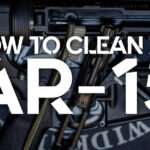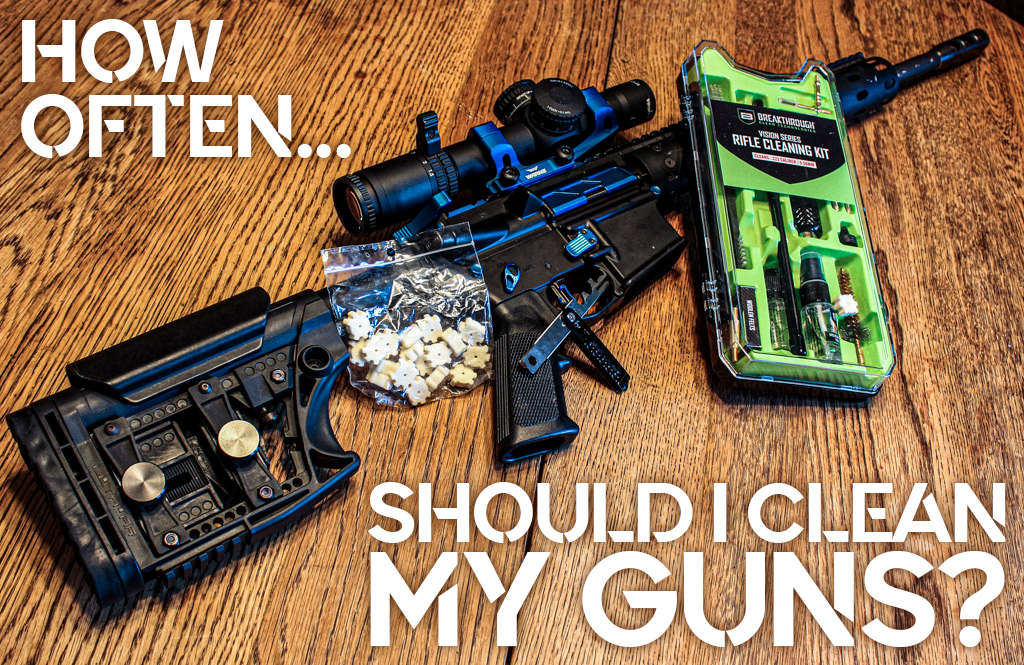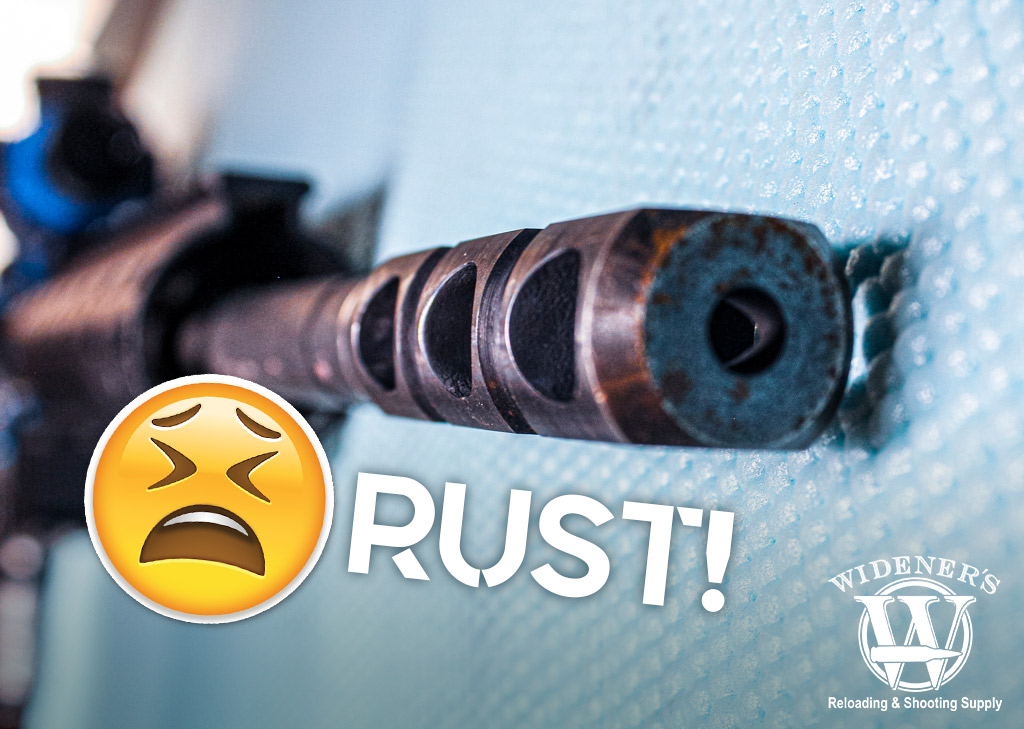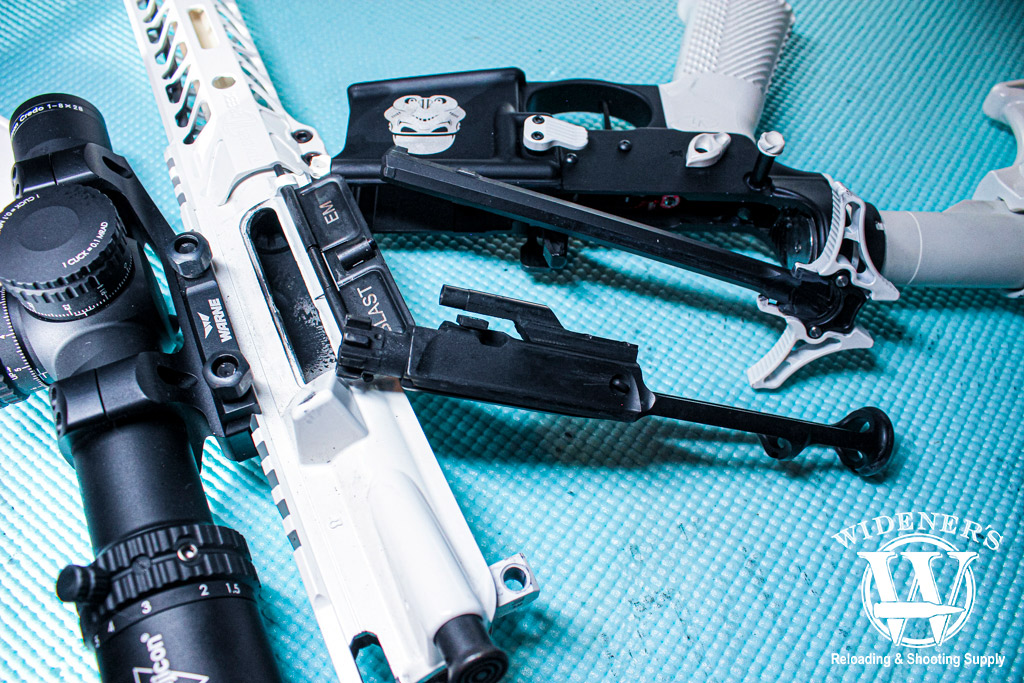

Guest Writer: Kenzie Fitzpatrick
You’re either someone who loves the process of cleaning guns or you’re the type of person who loathes getting home from the range only to have to clean guns. There’s really no middle ground. When you own expensive tools, the longevity of them depends on you taking care of them. However, not all guns need to be cleaned constantly. Some guns even run better with proper lubrication and the leftover carbon. So, let’s explore how often should you clean your gun and what can happen if you don’t.
Why You Need to Clean Your Guns
Rust Never Sleeps

Guns have only two real enemies, rust and overzealous politicians.
The biggest enemy of all guns is rust. While you may own a polymer frame pistol the internal metal components that make up the handgun and keep it together are susceptible to rust. If you ever shoot your firearms in the rain, fog, or even a light misting, your first action item when arriving home should be to disassemble and begin cleaning guns.
One of the absolute worst things you can do after shooting in the rain is put your rifle, shotgun, or pistol into a closed case, especially if it’s foam or cloth lined. When you do this, the moisture is now distributed into this material and is a breeding ground for rust. If you leave any gun in this case for too long after getting wet, when you open up that case I guarantee you’ll have a surprise waiting and a lesson you’ll never forget. Ask me how I know!
The best thing to do after cleaning wet guns is to leave the parts disassembled, lubricate them properly, and let them air dry out. The oil will also help prevent further rust (more of that in a minute).
Environmental Conditions
If you live in a more humid environment (looking at you Florida!), you may consider cleaning your guns more often than you do now. This is especially true if you don’t keep your guns in a safe and they are exposed to dust, changing temperatures, or worse. Think about your fan blades and how much dust collects on top of them. Your barrel and action probably have some sort of dust build-up on them. This is especially true if you leave the action open so pro tip: keep one round in the gun loaded or close that action so dust doesn’t get inside the gun.
If you do keep your firearms stored in a safe, I highly recommend keeping the moisture-wicking packets (called desiccant) from everything you buy to put in different spots in your safe. This is also a pro tip I use in my ammunition cans as well.
Function & Performance
Copper Fouling
A lot of shooters may choose a cleaning solvent that cleans lead and carbon, but they forget to address the copper fouling in the barrel of their gun. Copper fouling can come from different types of smokeless powders used in ammunition. Most often, bronze brushes will help decompose this build-up, but you always want to clean for copper as well.
Carbon Build-Up
Too much carbon build-up will jam even the most expensive and accurate shooting gun. It can also really wear on your parts if you rarely break down and clean off the carbon. Think of cleaning off carbon as your regular oil change in your vehicle. Most guns will run and treat you right if you give them the regular maintenance they need.
Ammunition Choice
The last reason why you need to clean your gun is that not all ammunition is made equal. Some ammunition is extremely dirty (hello Russian ammo!) while others are not. If you use dirtier ammunition, this will increase the regularity in which you need to break down and clean guns.
How Often Should You Clean Your Gun?

Clean and inspect your conceal-carry gun to ensure that it is in good working condition when you need it.
Carry Gun: Pistol, Revolver, Semi-Auto
Your life depends on this gun, right? It’s the most important tool you own. Your carry gun should be cleaned as often as every single week and immediately if exposed to water. If you’re like me, your carry gun is part of your everyday life. You strap it onto your waist and go about your day. I carry my gun at the range, while hiking, in freezing temperatures, and in the hottest of record-breaking heat indexes.
Your carry gun is exposed to sweat, moisture from your body heat, particles from your clothing, dust from the air, and more. One of the best indicators of my concealed carry journey is seeing the rusted screws on my concealed carry holster from being in my waistband every day. Your gun parts will start to rust as well if they’re not properly maintained. Don’t forget to change out your carry ammo as well. Even the best 9mm self-defense ammo can become fouled from typical carry conditions.
Competition Gun
A competition gun is brutally put to the test at matches and in practice sessions. Testing its limits is part of the shooting journey. When you pick out your competition gun, I do recommend breaking it in by running a few thousand rounds through it before cleaning it. The key to using the carbon build-up to your advantage is to make sure the gun is well oiled to heat the carbon and use it as a lubricant itself.
Ask any competitive shooter and they’ll give you a different answer for how often they clean their gun. It’s either good or bad juju and reminds me of Pedro Cerrano in the movie Major League. I always give my pistol a good cleaning before a major match because that is one aspect of my pistol that I can control. If my gun fails at a major match, it won’t be because I neglected to clean it. At larger matches that are over the course of a few days, I even clean my pistol after each day as I’ve shot in the rain, gotten mud all over it, and dumped it in dirty barrels.
Hobby Gun
If you just enjoy going to the range and shooting when you get the opportunity, I recommend cleaning guns as soon as you get home. For most shooters, as soon as the gun gets put up in the safe, it’s not brought out again until the next range trip. This is an extremely good habit to get into so when you pull a gun out, you know it’s clean and ready to fire.
How Often Should You Clean Your Rifle?

Shot a case of ammo recently? It’s probably a good idea to schedule a cleaning for your dirty rifle.
A rifle can run well when it’s dirty and oiled, but inspecting a few components on your rifle after each range trip can help you identify if you need to spend some time cleaning it.
Cleaning Your Rifle Barrel
Your barrel life is everything in a rifle. Depending on how often you shoot and what barrel is in your rifle, they can last anywhere from 2 years to 10 years. However, your barrel can last longer and shoot a lot more accurately when it’s spotlessly clean.
Precision rifle shooters can tell you and show you how one piece of carbon or spec of rust can impact the bullet’s trajectory. When your rifle barrel gets dirty enough, the bullet that comes out of it can be so off from not rifling correctly that the round will tumble, or roll, in the air and impact the target sideways rather than head-on.
Shine a flashlight down your barrel and up your barrel to inspect for dirt and debris. Make sure your rifling looks clean and clear after every range trip.
(BCG) Bolt Carrier Group
I always like to disassemble my bolt carrier group when I get home from the range. If there’s any carbon build-up, spend some time using a scraping tool to remove it. All BCGs should have three gas rings. Those gas rings are important to have and while your rifle can run with just one, making sure all three don’t break or fall off will increase the life of your rifle. If I clean nothing, I try to clean my BCG as regularly as every second trip to the range.
Muzzle Brake/Suppressor/Flash Hider
The last piece of your rifle build that can affect the accuracy if you don’t clean it properly is your muzzle brake, suppressor, or flash hider. Inspecting these regularly for corrosion and cleaning them out with a brush will break down any build-up. If you start to notice any blue or green coloring, this can be a sign of copper or brass corrosion.
How Often Should You Clean Your Shotgun?

Shotgun ammo spreads as it leaves the barrel, so it’s a good idea to inspect your barrel and keep it clean.
Cleaning Your Shotgun Barrel
Your shotgun barrel will get dirty after even just one trip to the range. Shotgun ammunition is so different from rifle and pistol ammunition. It’s a good idea to at least run a bore snake or brush through the barrel a few times after every shooting session. If you’re shooting competitively, I recommend bringing a snake or brush to clean out the barrel between every stage.
Shotgun Trigger Group
The trigger group of a shotgun takes a few steps to break down. It’s can be a spot where sand, clay, and other elements find a place to nest in. I use an air compressor to blow out this component after trips to the range and am surprised to find how many particles always come out.
Shotgun Action Cleaning
The action is where the majority of dust, dirt, carbon, and more will build up and where you need to keep it clean. Cleaning wipes are your best friend in wiping the action down and making sure you have a functioning shotgun. This is true of semi-automatics, pump, lever, and break-action shotguns. Always store all shotguns with the action closed to keep the internals clean.
Tools You Need to Clean Your Guns

Not sure what cleaning products to use? Start with products that have been around for at least a decade, there’s a reason the company is still in business.
Cleaning guns is part of gun ownership. Each firearm, or tool you own, needs the right set of tools to clean it.
Cleaning Solutions
Invest in good cleaning solutions. Breakthrough Clean, Seal 1, and Hoppes are all good cleaning products. I like to run a CLP all-in-one product through my guns first, then a solvent, followed by a copper cleaner. I use the Seal 1 products last as their final step, the paste, dissolves carbon on contact and creates a barrier that resists copper, lead, and carbon build-up. The paste impregnates the metals and gives me more peace of mind knowing they’re less susceptible to the elements.
Oil/Lubricant
Your guns will not function without proper lubrication. Yes, they’ll run for a while, but if your guns are bone dry, you will eventually have issues. The other reason why this step of the process is so important is that oil and water do not mix. Applying a thin coat of oil will prevent rust and other liquids from doing as much damage.
Cleaning Tools
Cleaning guns require more than an all in one snake or running a brush through a barrel. Invest in specific tools for specific guns. The best tool for an AR-15 is the Real Avid MSR Scraper tool for your BCG. Make sure you buy caliber-specific brushes for your pistols. A shotgun cleaning brush will require a longer rod to get the brush through the length of your barrel. You should have properly sized cotton swabs for each firearm as well.
How often should you clean your gun? Never rush through your cleaning process. Take pride in what you own and they’ll last forever. The worst thing that can happen is your gun jams because you didn’t properly clean it. Cleaning guns is the one thing you can control.


